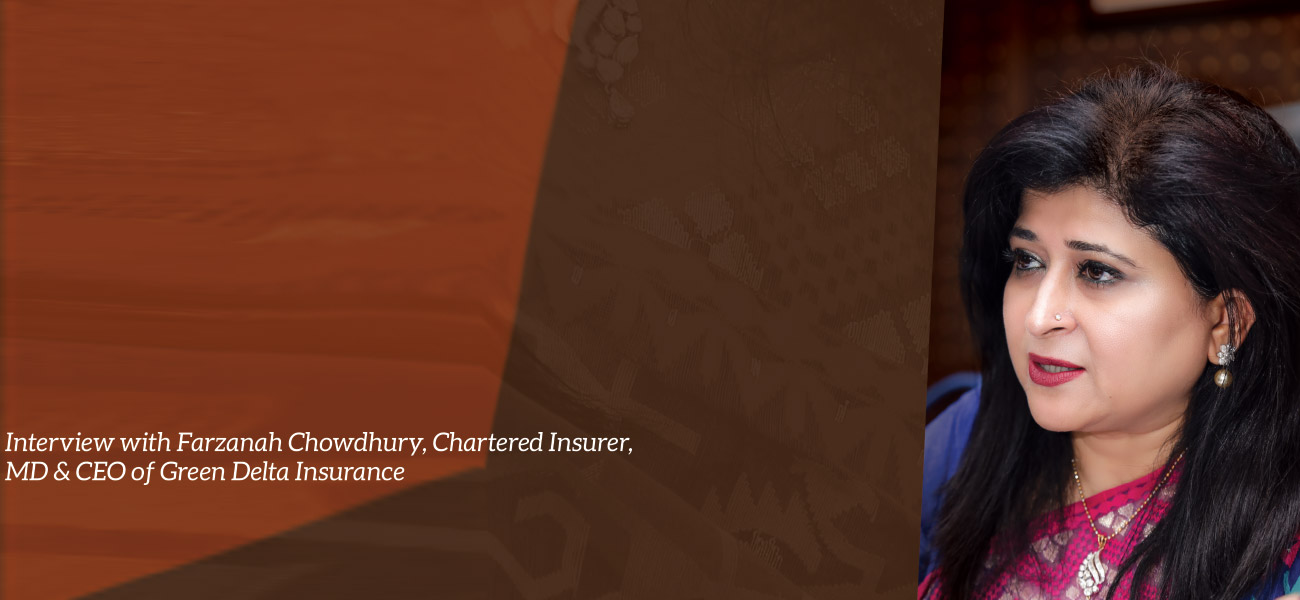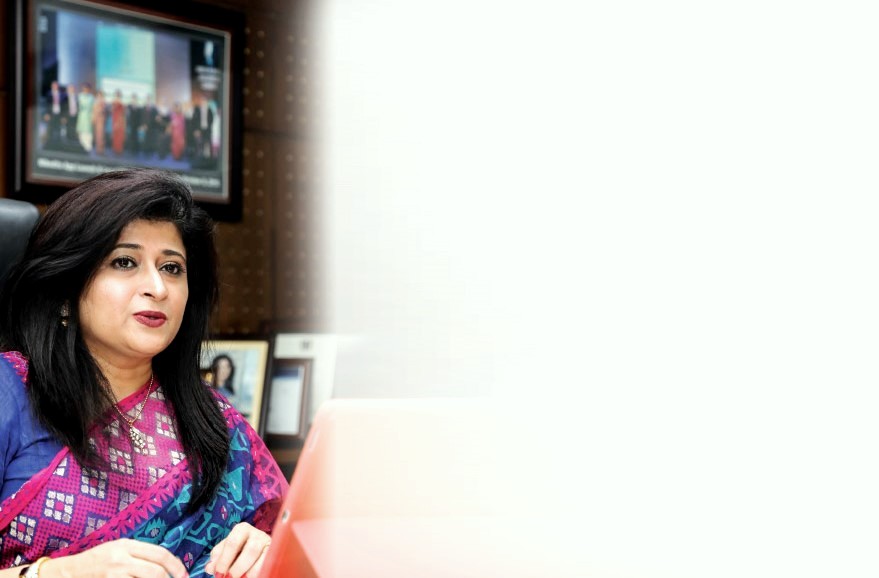
As the insurance sector in Bangladesh begins to spread its wings more widely than ever before, owing to friendlier regulations and technology, local and international insurance providers vie for satisfying chunks in the pie of the emerging insurance market in Bangladesh.
Among the local providers of general insurance, Green Delta easily stands out for its decisively modern approach and staunchly forward looking strategies. Driving its remarkable venture, company’s MD and CEO Farzanah Chowdhury, Chartered Insurer, led Green Delta to gaining AAA rating for five consecutive years and many other remarkable achievements unheard in the industry before.
Last year in an interview with Fintech, Farzanah Chowdhury said Green Delta intends to push the boundaries of a typical insurance provider and aspires to create a one-stop financial service platform.
Almost a year later, Fintech catches up with her to learn about the latest.
We spoke with you a year ago. Fill us in on what happened since then?
2018 has been a tremendous year for us both in terms of achievements and innovations that we managed to bring into reality. We have launched a digital insurance platform, which is the first of its kind in Bangladesh. Not only we launched digital insurance, we have also integrated a seamless platform that allows our customers and policyholders to pay their insurance premiums online through different payment service providers. Subsequent to launching the digital insurance, we conducted afour-month longsales campaign recently and brought about around 30 thousand people across the country under coverage of retail insurance. With the motto to ensure “insurance for all”, we are relentlessly pushing boundaries in order to optimizing thepolicy buying processes more convenient and hassle-free for our customers. While most of our products us are growing, we are continuously researching and analyzing big data to incorporate new innovative and useful features to our products and services. Besides, we are working with blockchain as one of our new projects.
In 2018, we have signed quite a lot of MoUs with multiple renowned corporate entities operating in different industries. Apart from agreement with Dotlines to integrate technology for bringing insurance to everyone’s doorstep, we have signed MoU with Bank Asia to cover the farmers’ credit in 2018. Most recently, we have signed an agreement with Syngenta Foundation regarding Weather Index Based Crop Insurance, which would enable us to provide insurance coverage for the paddy and vegetable farmers in the Northern part of Bangladesh through different NGOs, MFIs, farmers’ hubs with contribution from Swiss Agency for Development (SDC). We are also working with renewable energy to promote it across the country and we insured a massive solar project in Teknaf which was inaugurated by theHon’ble Prime Minister.
To reflect upon our achievements of 2018, we are very pleased to let you know that we have been awarded with the ‘Public Trust Award’ by Chartered Insurance Institute UK (CII, UK) for building public trust ininsurance and financial services. Moreover, we have achieved a series of awards in 2018 including, Emerging Asia Insurance Award, IADA Award, ARC Award, ICAB Award, ICMAB Award, ICSB Gold Award and Bangladesh Best Employer Award. Our achievements are now such that we have only ourselves to compete with in the years to come and we hope we will continue to exceed our own milestones in future.
You promoted ‘Nibedita’ a lot and it has been very visible. Tell us about it.
‘Nibedita’ is actually a comprehensive insurance for women. And we have launched two other versions of it, one of which is to cater to the mass people including professionals, home makers, entrepreneurs, and even social or government workers and the other variant is to cater to the privileged society.
We launched ‘Nibedita’ three years back. Within these three years, we reached more than three thousand women. This scheme covers key security areas such as accident coverage for customer’s family, compensation for accidental death or disablement. The product is designed to provide a hassle free claim management, affordable net premium, trauma allowance and many more. The unique feature of the product is a mobile application, that enables the policyholders to avail quite a number of augmented and auxiliary services, which are exclusive only for Nibedita policyholders.
Tell us about new projects currently in the pipeline.
We are looking into seed funding. We have plans for covering SMEs and provide platform for people working with innovative ideas. The seed funding will facilitate the business as well as help encourage startups to forward their business ideas and make them a reality. We have plans for larger seed funding as well.
What is the legal situation in Bangladesh for employee insurance? Should there be stronger laws requiring organizations to provide insurance coverage for employees?
Employee insurance is not mandatory by law in Bangladesh. Banks dictate what insurance to take out in a loan. Insurance in Bangladesh is largely peddled by providers; in other words, the general public never typically take out insurances and there is no laws mandating this.
The insurance coverage for employees are typically very fragmented from company to company. While a lot of organizations might have life insurance, they don’t have an accident insurance or health insurance for instance. In other instances, many other organizations have corporate group health insurance coverage, while they don’t have any life insurance or accident insurance coverage.
If we ponder on the scope of what can be done from legislative end, I think there are some scopes for legislating. I suppose, legislative guidance or directionto opt for accident insurance for those businesses whose employees are exposed to risky day to day jobs could be a suitable measure given that a majority of our population is labor class. However, I don’t think it is necessary to make it mandatory or compulsory, since it is ultimately a choice for the respective corporate entities.
Your agriculture insurance has had a successful test run. What kind of growth you are looking for in this segment?
We have come a long way in the past three years actually. We launched a promotion campaign three months ago and at the end of it the number of farmers under our coverage grew to over 10 thousand. We have been able to settle claims of around 2,200 farmers for unseasonal excessive rainfalls, cyclone signal and cold spell on different seasonal crops.
We have launched the weather index based agriculture insurance to help the farmers deal with the risks of extreme climate events like heavy rainfall, downpour, drought and cold waves. This policy has been launched in several areas of the country through a digital process.
As it happens, the farmers are willing and happy to pay for the service. And that is because we provide the best service and there is coordination and affordable price policy fitting to the need of the individual customer tailored as per the weather data, crop and location.
We want banks, seed and fertilizer companies to work with us so that we can provide them with different product bundles in insurance coverage. Thanks to IFC, BFP-B Challenge Fund, Agriculture value chain project of USAID and MetLife Foundation for extending their supporting hand to us for making this product bring to reality. I think a social security shield will be created among the farmers if this project succeeds which will help counter the after effects of natural disasters.
We plan to reach about 20 lakh farmers to within 2030 through many different innovative products under the banner of agriculture insurance. We strongly believe and hope that with support of the partners and regulatory body, we will be able to cover a very broad range of risks of farmers in the near future, especially because we are empowered by sophisticated technology including satellite forecast and interpolated weather data updated weekly.
Our prime work now is to work with microfinance, seed bag, top clinic, immigration contract, etc. And it is the one of the areas we are looking in to make a big impact. We recently signed with the first blockchain company in the world and in the agri-space. This agreement would enable us to deploy technology that can monitor cattle. We are using microchip which enables keeping track of the cattle health through smartphone apps, which would help ascertain the correct market value of the cattle. After successful deployment and implementation of the project, farmers will be able to take bank loans by using their cattle as collateral. So it would function as equivalent to security deposits. Once we deploy it, I think it will create a massive positive impact for the farmers and for country as well, since Bangladesh is home to around 25.7 million (2.57 crore) cattle population.
For this we need the banks and telecom operators as partners. We strongly believe that it will be able to create a delightful transformation in the valuation and identification of the cattle population of our country when we will finally implement this.
 The recent incidents of fire have caused a lot of public discussions regarding fire safety, but insurance is still not something that is present in the public discourse. What kind of coverage is possible in a hazardous environment like Dhaka?
The recent incidents of fire have caused a lot of public discussions regarding fire safety, but insurance is still not something that is present in the public discourse. What kind of coverage is possible in a hazardous environment like Dhaka?
If there is a mass scale disaster in Dhaka’s Gulshan and Banani the whole economy will take the blow. Everyone should think about insurance seriously now. Without an insurance policy you will have enormous difficulty to get back to your feet, if you can make recovery at all.
The problem is insurance is perceived as an expensive thing. After the disastrous fire in FR Tower and earlier in Chwakbazar we wanted to reach out and be active on this issue. But it was discouraged. Policy makers should step up now to help get insurance where it’s needed. We are doing our part.
What are the major global trends in insuretech? And what insuretech practices do you intend to introduce or bring to Bangladesh?
You hear about fintech revolution and fourth industrial revolution. That is the global perspective. And from that perspective you have to create tech-based solutions. In case of Bangladesh, we are trying to pace up, but we still have a long way to go and have to invest a lot in fintech to reach the global standard.
On the global level, many think that Amazon will be taking over soon on the insurance side because they are technology expert and they have risk mitigation tools,but it’s not going to happen so soon because adoption of all tech related solutions take significant time starting from its piloting, test runs, launching and then mass circulation. Moreover, it also takes time to get the general mass accustomed to the basics functionality and utility of the tech solution that will be replacing the conventional solution that general mass is used to.
We are trying to create a fully automated seamless ecosystem where in the same platform you may get many services. We want to create a system for our future generations where everyone can be secured. And of course, one of our core focus remains empowering women and youth because women and youth empowerment are the keys to success from my perspective. I personally think, we are progressing with a holistic approach keeping the composition of our population in mind, where around 50% are women and the median age of the country is around 26. So at conclusion, I would day that our products and services would be revolved around the need of our people while trying to integrate insuretech to deliver seamless financial platform not only for delivering smooth and best in class customer experience, but also for ensuring financial and economic security for our people while pacing up with the global trends.








